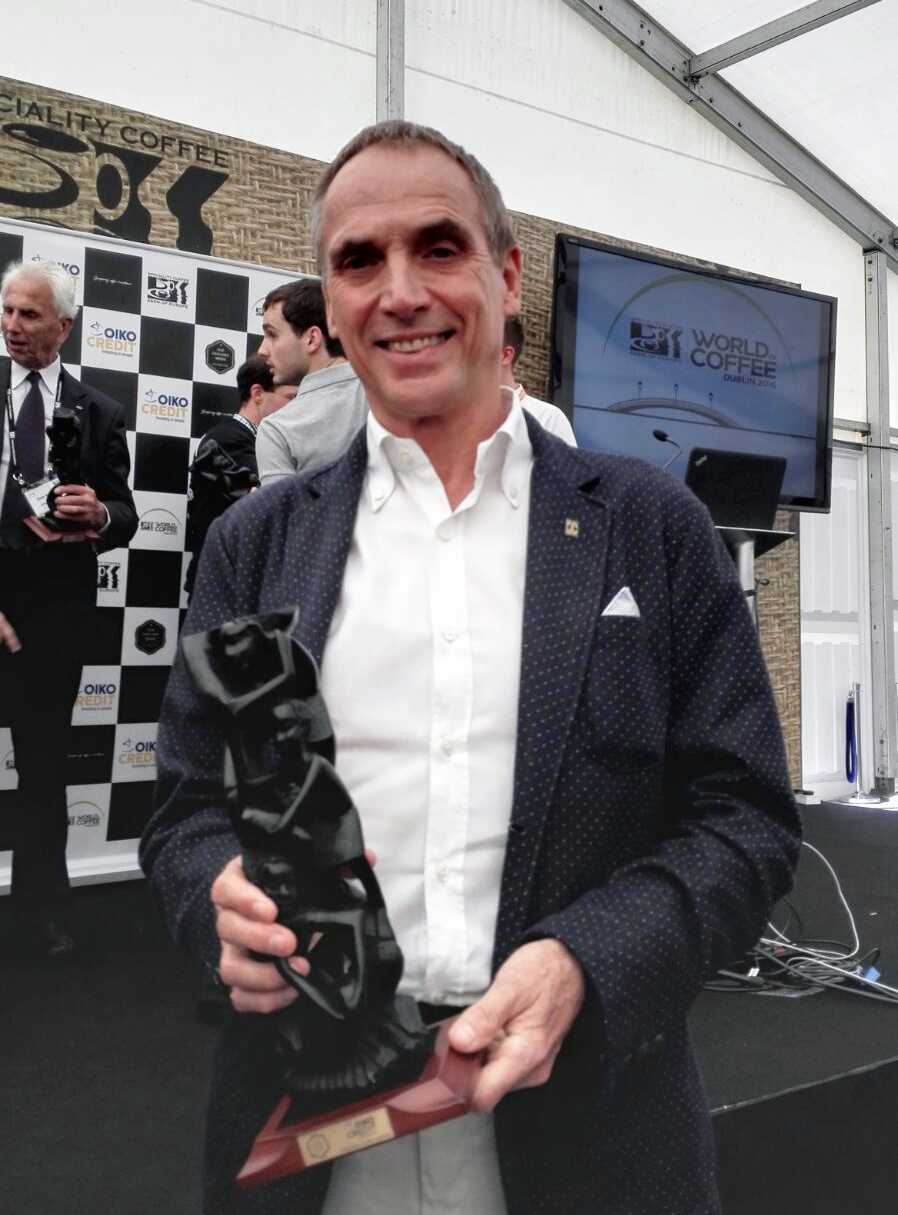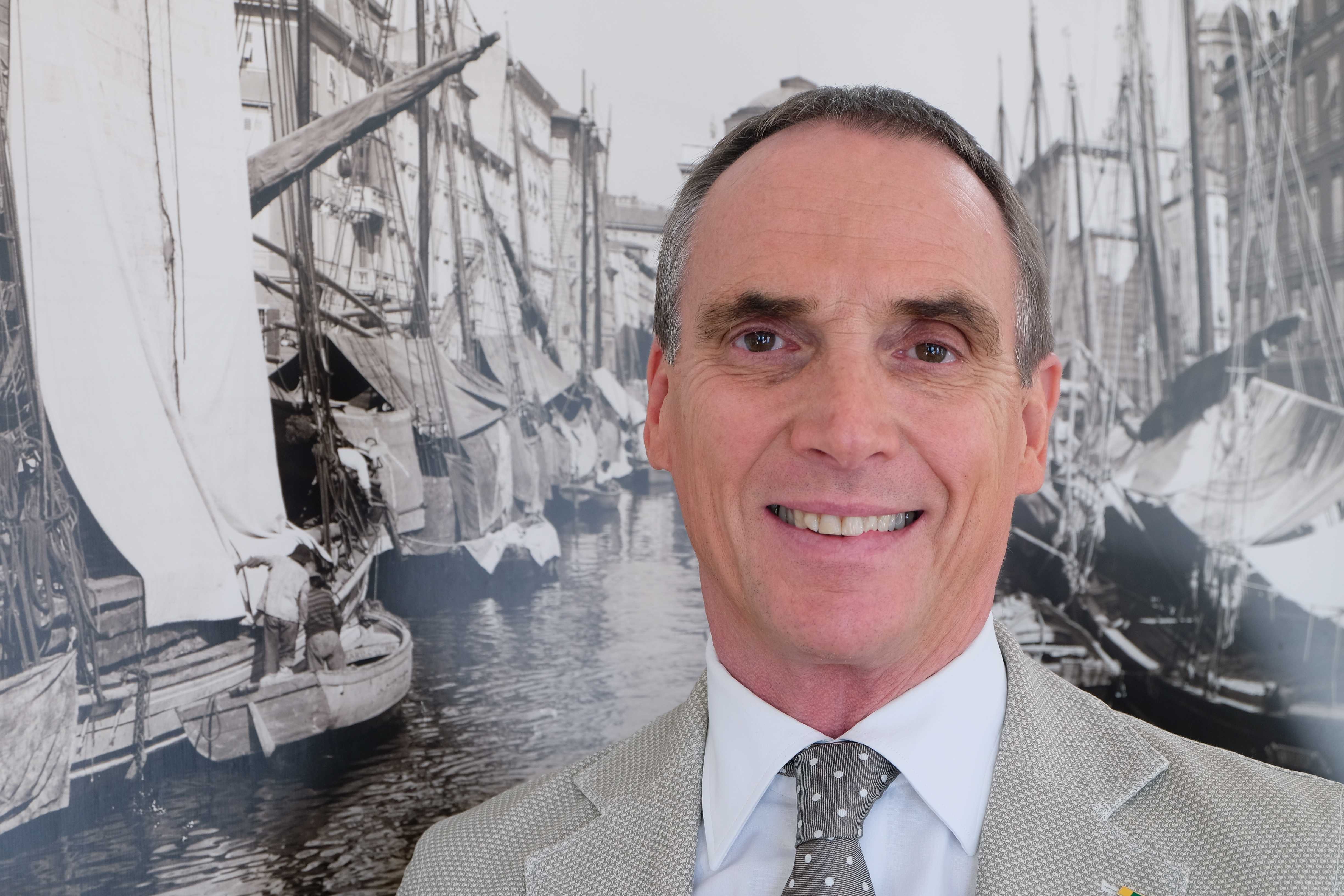MILAN – In this exclusive interview to Comunicaffè, Edy Bieker (in the pictures), coffee expert at Sandalj Trading Company, talks about coffee traceability and certification programs, single origin products and their perception among consumers, the role of baristas, as well as the new trends in the Italian coffee market.
Is traceable coffee always better coffee?
When it comes to quality, not exactly no. In this case, one can only judge by looking at the cup. I have often cupped coffee without a clear indication as to its specific origin and realised that it had superior aromatic characteristics compared to traceable coffee, and vice versa.
So what is the added value of a certificate of origin?
It pinpoints the stages of the beans’ journey from cherry to cup. A certificate of traceability provides information about the supply chain at origin, giving clearer indication as to whether processing and harvesting has been done with qualitative outcome in mind. I am afraid though that traceability is increasingly being exploited for commercial purposes, rather than the nobler purpose of information and consumer awareness.
What do you mean exactly?
More often than not, both importers and producers use information about the coffee’s traceability to justify a premium on that product, without a quality elevation –in organoleptic terms, that would warrant the asking price.
How are consumers reacting to the introduction of single origin products in mainstream outlets such as supermarkets, and what does this mean for roasters?
Information about the origin of the beans and cup preparation tickles a consumer’s predisposition for curiosity. It can also fool purchasers into thinking that more information automatically entails higher quality. One cannot expect that the average consumer be able to distinguish defect and organoleptic characteristics of a supermarket-bought coffee, especially because coffee culture is a relatively recent phenomenon. I am in no way saying that the majority of certified coffees for example are not of superior quality, but I believe consumers should be warned that sometimes, traceability is not a sure recipe for high quality.
Having discussed consumption, what is your opinion on the roles of baristas and roasters in this new coffee wave?
Baristas, roasters and also importers have certainly been brought to the forefront of this model. I am for one, extremely excited about consumers being presented with newfound choices whose trickle-down effects are momentous when it comes to coffee culture and education. Many Italian cafés for example have a single coffee offering, but when you vary it, consumers are compelled to make a decision, increasing their interest to test and understand what they might like and not like.
 Should the consumer be guided?
Should the consumer be guided?
Most certainly. Even though we are currently witnessing an exponential increase in coffee culture compared to one decade ago, the majority of consumers are still unaware about qualitative characteristics and benchmarks.
In your opinion then, this is an opportunity for roasters.
It is an opportunity for both roasters and bartenders, as long as there is a strong foundation of awareness and knowledge. If gets seized as a purely commercial operation, it will behave like a bubble, and as such will eventually burst.
Are Italian roasters just beginning to seize this opportunity, or has it been an on-going process?
I’d say it’s the beginning. Organic and Fairtrade certifications for example, we’ve long believed in, but have started having a following only in recent years. Though roasters are increasingly realising that in order to remain competitive, one has to constantly evolve and develop new attention-grabbing products.
In your honest opinion, are there any certifications that don’t measure up in terms of sustainability?
Unfortunately, as testified in recent news reports, some certifications are easy to manipulate if unchecked for long periods of time. In this case, there can be a lack of consistency and transparency in terms of the certificate’s goals and the reality of things.
Furthermore, when it comes to traceability for example, it is of vital importance that the plantation be checked in person. The problems often lie ahead, upon leaving the origin.
How does Sandalj Trading verify traceability?
Where possible, we go straight to the origin. We also have decade-long relationships with many producers, due to the fact that the late Vincenzo Sandalj spent most of his time in producing countries getting to know plantations and cooperatives. We are now committed to pursuing the same approach and are especially zealous in our verifications when it comes to new contacts.
As a consequence of this, I assume that Sandalj’s added value to clients during the past 70 years, has been the interconnection between origins and cup.
The idea of venturing into a Sandalj-verified traceability, parallel to other certifications, came to Vincenzo over two decades ago. Our price list includes lots from our Traceability Project, whose pillars are high quality and origin recognition.
Why does traceable coffee cost more?
The premium exists because Sandalj-approved traceable coffees are yielded from a sustainable and quality-oriented supply chain.
But are roasters, whether Italian or foreign, interested in paying more for such coffees?
Micro and medium-sized gourmet roasters understand, more often than not, that quality and excellence enable them to carve a portion of the market, making them intent in paying more for distinguished lots of coffee.
Lots like Jamaica Blue Mountain?
Jamaican coffee is a good example. But there are many lots that fetch very high premiums, such as the Cup of Excellence winners sold at auction.
Cost-price is in Italy, a stronger determinant of demand, mainly due to the fact that on average, espressos in Italy are priced on the lower end.
Do you think Italian consumers understand concepts such as single origin, traceability and specialty?
All consumers have the potential to understand these concepts, but it is possibly only when if they get explained in an intelligent and eloquent manner. The issue with Italian consumption in particular is that it is fast-paced, so there is little time for baristas to convey information to consumers.
The role of baristas, and roasters before them, therefore has a vital importance.
Absolutely. When it comes to wine for example, there is evolving knowledge, and consumers are therefore able to develop personal preferences. This ability is not present in coffee consumption. The industry has always been geared towards high consumption and little to no information. The coffee is consumed as a tonic to wake up or during a break in which the social dimension prevails over taste and basic quality requirements. Consumption lacks the moments needed if one wishes to provide knowledge to consumers and develop a more elaborate coffee culture.

What are Sandali Trading’s requirements when it comes to quality? When you receive a sample, what exactly do you look for?
Let me start by specifying that we cup all lots using an espresso extraction. In this case the fundamental first step is recognising flaws, because this extraction draws out everything with greater intensity, meaning both imperfections and virtues.
In addition to having very specific knowhow and experience, we always stress that there is no vademecum with a list of requirements for coffee to be deemed good. One has to apply a macroscopic approach, and always bear in mind that with consumption, region-specific preferences have weight, and every coffee should therefore be evaluated within its target market in mind.
If you were to advise roasters and baristas with regard to traceability, certifications and controlled supply chain, what would you tell them?
I am unreservedly in favour of certifications and of a supervised supply chain. Both provide us with verifications about the production process and those involved. What I want to call attention to is that one should never disregard quality if it comes to the expense of traceability, and vice versa.
In an undefined future though, coffee consumption will become aware of quality. Do you think that players who invest in quality today might reap the benefits anytime soon?
It is the great challenge of the future. I have always believed in quality, and so has Sandalj Trading. We have invested in high quality, and I can say with upmost certainty that the clients I see involved with quality production, have seen results. It is undoubtedly harder, but is without doubt the way forward both in Italy and abroad.
Are knowledge and competence part of the secret recipe?
Knowledge, competence, constant research and professionalism.
Does organic coffee equal high quality coffee?
Most certainly not. The certification and the coffee’s quality are not necessarily parallel. The former is important with regard to production sustainability, the latter is in no way a consequence.
















